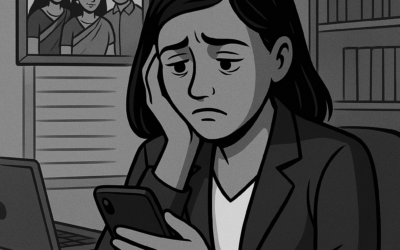“Chai bolo bhai chai bolo!”
“CHAI!”, we said together. And then we giggled. The tea vendor smiled too. This was how a conversation between a stranger and I began while travelling in the winters of Rajasthan.
The art of initiating and navigating conversations includes curiosity, earnestness and active listening. Ability to have an engaging conversation is undoubtedly an art. I cannot emphasize this enough.
There is a fine line between respecting boundaries and being nosy. Bombarding a person with numerous questions without sharing equally about yourself is a red flag. Here are some recent instances of unexpected conversations and interactions I had with strangers that resonated and stayed with me to the urge of sharing it with everyone.

The Boy Who Remembers Phone Numbers
While travelling on the train earlier this year, I purchased a ticket in the sleeper class. As my compartment was next to the general one which was overflowing, there were many passengers who shifted to the adjacent compartment where I was. People were sitting all over the place. Five people sat with me on my side lower seat. One amongst them was a boy of 10 years of age. He was sitting aloof and had two big sacks of grains with him. The size of both sacks was almost similar to his height. He wasn’t talking to anyone. People sitting next to him didn’t seem like his family to me. I was worried. I initiated a conversation with him by offering him water. He took it immediately and gulped the whole bottle down. Then I spoke…
“Kaha jaa rahe ho?.”
“Jaipur. Aur aap?.”
“Main bhi Jaipur hi jaa rahi hoon. Kya aap akele ho?.”
“Train mein saamaan aur main toh chadh gaye lekin maa aur papa nahi chad paaye. Bohot bheed thi. Papa ne platform se kaha ki woh mere bade papa (Father’s elder brother/uncle) ko phone karenge Jaipur mein aur unhe station aane ke liye kahenge. Par papa ke paas phone nahi hai. Kaise karenge woh call?.”
“Aapke bade papa ka number hai aapke paas?”
“Haan yaad hai mujhe.”
“Aap mere phone se call kar lo unhe.”
“Dhanyawad didi.”
My lesson here – Remember phone numbers of your closed ones.

Stuck In Traffic
The time was 17:27. I was boarding a train in the winter of 2022. I rushed through the hustle bustle of passengers stuffing their luggage below the seats and on the hooks provided. As I reached my seat, a man had already occupied it. At first glance, he looked extremely worried. When he realised it was my seat, he got up to leave. I told him he could sit for a while. He had a RAC (Reservation Against Cancellation) ticket for the seat in front of mine. He was hurriedly making calls to a few people and talking in almost whispers but audible.
I drank water and offered it to him as well. He took it almost immediately. Out of curiosity, I took the plunge and asked him about his restlessness. He seemed eager to converse and spoke in the fastest speed possible for him.
He was the leader of a company that performed dance, acrobats and magic in social functions and spaces in Hyderabad. They had an event in two days, and one of their team members was stuck in traffic 15 minutes away from the railway station. The leader was hoping the train would depart a little later than usual so that his colleague could board the train. They did not have a backup performer. The venue where they were scheduled to perform had already paid them in advance. They wouldn’t be able to pay back this advance money in the event of the performance being cancelled, as they had used the advance to purchase new costumes for the group.
It was already 17:30, and the train was to officially depart at 17:35. After hearing about his situation, I too was hoping for the train to be a little late. The man was shaking and started pacing the lengths of the compartment. All signs of anxiousness and nervousness.
My eyes and attention were totally fixated on this man. I started foreseeing the possible consequences that would come his way if the team member did not arrive on time. Firstly, the performance might get cancelled. Secondly, the leader would have to borrow money from somewhere to pay back the advance to their client. The client’s reaction is unknown at this point. Maybe they might take stricter action. Maybe they ask for additional money for the expenses they might have incurred on their side for the event, like booking the venue, inviting people, seating arrangement, sound equipment, food and beverages and so on. While these thoughts ran through my mind, I started feeling like I was one of the members of the troop. The whole situation suddenly dawned on me, and I started thinking from the leader’s point of view.

Finally, the train started with a sudden jerk at 17:37. The leader stopped walking, sat down and took a long breath. It seemed like he was preparing for the events that were to follow as a result of his team member failing to board this train. The leader called his team member, but he was still on the road. I observed his reactions diligently. The reality finally dawned on him, and he started to think about alternatives.
I was unsure about my position to interfere at this point. But now I was deeply involved in this situation in my mind. His other team members had their seats in the adjoining compartment. They settled their luggage there and joined him to discuss the future course of action. Some of them were checking for other trains on the route. The leader started calling people who could lend him some money to buy a flight ticket for his teammate. Two of them had already started changing the choreography of the performance due to the recent turn of events.
Travelling by bus was a viable option, I thought. I spoke to the leader about this. He seemed not too enthusiastic at first because it would take a lot of time to travel. Maybe he would have to change a couple of buses, too. His main concern was that the teammate would not reach on time to the venue and the money spent on the bus tickets would go waste. The two dancers who were tailoring the choreography heard us and were on board with the idea of travelling by bus. The dancers and I started looking for a route (on the RedBus app) through which he could travel if he took the bus in the next hour or so.
In under 15 minutes, we derived a solution. The teammate would have to catch a total of three buses. If the buses were on time, he would reach the venue two hours in advance.
Finally, upon reaching this resolution, they heaved a sigh of relief and retreated back to their seats while the leader directed the teammate left behind, on his next steps. I took a peek at my watch. It was 18:05.

Woman With A Voice
It was a rainy Saturday afternoon in Pushprajgarh when I met this woman on the bus. She was rocking her infant son to sleep. I took the seat next to her. I couldn’t resist initiating a conversation with her. “Aapka beta bahut sundar hai.” “Accha.. Dhanyawad.”
For a while we didn’t speak. Soon, she started asking me about my destination and my purpose for the trip.
The conversation began with her curiosity about the city life from where I had come and somehow reached a point where I was telling her stories from my childhood. Recently, when I was recollecting this day, I accepted the fact that I had the most bountiful conversation with someone, especially a stranger in a long time.
While talking about travelling in trains, the woman said excitedly, ”Recently I had a scary experience on the train.”
It was around dinner time when she boarded the train. There were two men in the seat next to hers. Around 7pm in the evening, the woman smelled alcohol nearby. The two men were drinking alcohol mixed in a cold drink bottle to avoid suspicion. The woman contacted the ticket collector and complained about it. The railway official threw them out of the train in the next station. She recalled how she felt unsafe in that situation. She was primarily worried about her infant son who was with her that day.
Why Are These Experiences Significant?
These instances speak to me and remind me of the power of casual conversations. They surprise you out of the blue and teach you humility and respect. Conversations with an intent have an already established purpose. You are prepared for it. However, casual conversations like the above stories make you wonder about the complexities in the life of human beings. You realise how each story, their struggles, their ability to shake your world are beautiful and important.









Conversations-Active Listening-Learning
In the book IKIGAI- The Japanese secret to a joyful life, one of the four probing questions is ‘What does the world need more of ? When I asked this question amongst my people, the most popular answer was ‘love’. I think the world needs more empathy. Empathy culminating over time will lead to love.
According to me, love is a by-product of empathy. Directly expecting love is putting too much pressure on oneself and the relationship. Empathy will help the other person feel heard and important. Love will blossom organically. Most of the time, this is what a person needs or desires. TO BE HEARD.
You need to move through the world by listening to other people. Actively trying to engage with people, young or old. This will involve the practice of accepting yourself in the company of other humans. Most importantly, you need to be open to the world around you.




0 Comments